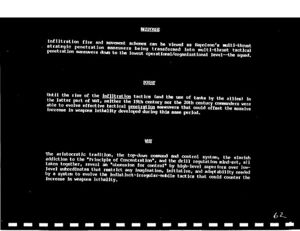Patterns of Conflict
| The works of |
| Works of John Boyd |
|---|
OODA WIKI Edition
Quantico Transcription
And so in a sense what they’ve done, they’ve taken the infiltration fire and movement schemes, you can look at Napoleon’s multi-thrust strategic penetration maneuvers being now called multi-thrust tactical penetration maneuvers. In other words, they’re fine graining those penetration maneuvers and doing it all the way down to the tactical level rather than just the strategic level, [20:00]all the way down to the squad.
So my point then, is until the rise of the infiltration tactics, and of course the use of tanks by the allies, neither the 19th century nor the early 20th century commanders were able to evolve tactical penetration maneuvers to offset the increase in weapons’ lethality until these things start showing up.
And you have to ask yourself, why? And here’s some reasons. The aristocratic tradition, that top-down mentality, top-down command and control systems. The slavish addiction to the “principle of concentration.” And the drill regulation mindset, and they’re going to do all these things in a choreographed way.
All taken together, what it does, it reveals the obsession for control by high-level superiors over low-level subordinates to get them to do what they want. And what it really does, it restricts imagination, initiative, and adaptability in order to confront a different situation than they’d had before.
Now if you go back, remember I said yesterday, why were the 19th century and early 20th century commanders unable to cope with this, and develop tactical schemes in order to cope with increase in weapons— this new weapons technology? Here’s the reason why. It’s kind of a mindset. That’s what [unintelligible].
And I’m trying to tell you something. The more you try to control your people, the less control you’re going to have. Exploit sense. You can’t make people automatons. You get control by getting them to understand that they’ve got a piece of the action. They’re important to the operation.
And in that sense, rather than talk about discipline, the thing you want to inculcate in people is what I call self-discipline. That’s the only discipline that counts. And that’s what you have to do as a commander or leader. And when you can inculcate self-discipline in your unit, and get them to do things and take those initiatives, you then have control. But if you don’t do it that way, you really don’t have it. And that’s what I’m trying to [unintelligible].
